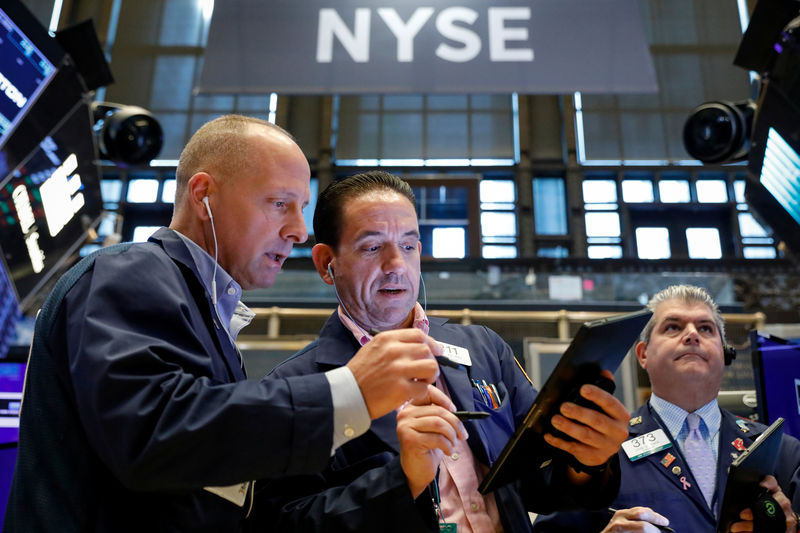By Sujata Rao
LONDON (Reuters) - Relentlessly falling borrowing costs worldwide may be setting the stage for a further squeeze in global equity supply, with signs that more companies, especially in Japan and Europe, will exploit the cheap money wave to buy back shares.
Rock-bottom borrowing costs in the decade after the global financial crisis have already played a role in draining the world of investable equity through share buybacks, mergers and acquisitions and de-listings.
With not enough shares issued to offset those withdrawn from circulation, equity supply has shrunk steadily, one reason for record share gains in recent years - especially in the United States, where 80% of firms are estimated to conduct buybacks.
The result is that net global equity supply should be around zero this year, the same as in 2017 and 2018, JPMorgan (NYSE:JPM) predicts. Net supply was negative in 2016 for the first time ever.
The buyback boom is one side-effect of rock-bottom interest rates. And with central banks again in rate-cutting mode, the trend could get a fresh lease of life.
"If you look at the cost of equity versus the cost of debt, the incentive to issue debt and buy back equity has never been higher," said Supriya Menon, senior multi-asset strategist at Pictet Asset Management.
Cost of equity is what shareholders demand as returns, while cost of debt is what a company pays to borrow. To source capital where it is cheapest, companies tend to arbitrage between equity and debt - and these days the collapse in bond yields makes it far more alluring to borrow than to list equity.
Menon highlighted an "exceptionally wide" gap between the yield on investment grade European and U.S. companies' 12-month forward earnings and the average yield on their bonds.
(For a graphic on 'US equity yield vs debt yield', click https://tmsnrt.rs/2ys8eIK)
Analysis of Europe's biggest companies shows the extent to which equity costs outstrip the cost of debt.
(For a graphic on 'The cost of capital: Debt versus equity', click https://tmsnrt.rs/2MyzRZ4)
(Debt versus equity interactive https://tmsnrt.rs/2Mw7OJL)
JPMorgan says a flurry of high-profile stock market debuts this year from the likes of Uber (NYSE:UBER) and Pinterest (NYSE:PINS) will not materially change the net supply picture; its data shows listings worldwide are down 20-30% year-to-date while buybacks should clock in around $1 trillion over the course of 2019.
"Buybacks are still tracking record levels and you don't have that many IPOs, so you get negative net equity issuance. That's been a major driver of equity performance and I don't see any let-up," Pictet's Menon said.
Goldman Sachs (NYSE:GS) meanwhile predicted Wall Street would enjoy its best year since 2013, even as it cut earnings estimates.
JOINING THE PARTY
U.S. buybacks have lost some momentum, perhaps as the impact of massive tax cuts fades. New stock buybacks averaged just $2.8 billion daily in the last three weeks, according to Trim Tabs Research, the second-lowest volume in the past eight earnings seasons. The number of announcements stood at 3.1, the lowest in the past eight earnings seasons.
Instead, it's Europe that's ripe for a buyback wave, analysts say.
Nikolaos Panigirtzoglou, market strategist at JPMorgan notes European share buybacks last year equated to just 1% of market capitalization versus around 4% in the United States.
With German benchmark bond yields, the main reference rate for euro debt - crumbling more than 70 basis points this year to around minus 0.5% - corporate borrowing costs have collapsed by two-thirds , offering companies a unique opportunity to embrace the buyback culture.
"It is attractive for European companies to issue debt or take out bank loans for buybacks and they could have been doing it for years. It's similar in Japan, they have been enjoying zero interest rates for even longer," Panigirtzoglou said.
In fact, net European buybacks amounted to $100 billion in the past year, Morgan Stanley (NYSE:MS) calculates, a record high run-rate, even if dwarfed by last year's roughly $800 billion U.S. tally.
(For a graphic on 'buybacks', click https://tmsnrt.rs/2OcX0mo)
Morgan Stanley advised European firms to cut dividends and conduct buybacks instead.
"The much lower level of corporate bond yields should provide for a decent 'refinancing bonus' as companies swap out their old debt and re-issue new bonds at today's very low yield levels," it said.
There are also signs that Japanese firms, notoriously stingy with buybacks, are joining the party: Buybacks hit a record 6.5 trillion yen-plus ($59.8 billion) in the fiscal year to April 1 2019 and Goldman Sachs predicts a further 20 percent increase in the year to April 2020.
(For a graphic on 'Japan Buyback', click https://tmsnrt.rs/2E9ABPV)
The reason buybacks have been historically less popular in Europe and Japan is that shareholders have tended to prefer dividend income. Despite last year's buyback surge in Europe shareholders earned 80% of their cash returns from dividends, according to Morgan Stanley.
But in fact, the 20% share of buybacks was a record high for Europe, the bank said, predicting several companies to deliver bigger buybacks in the coming year than expected.

($1 = 108.6200 yen)